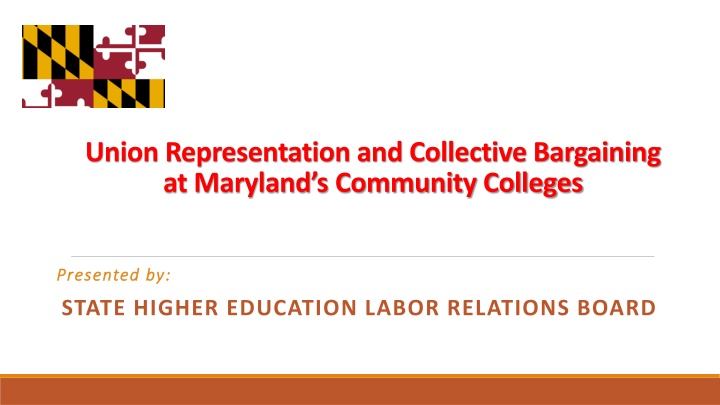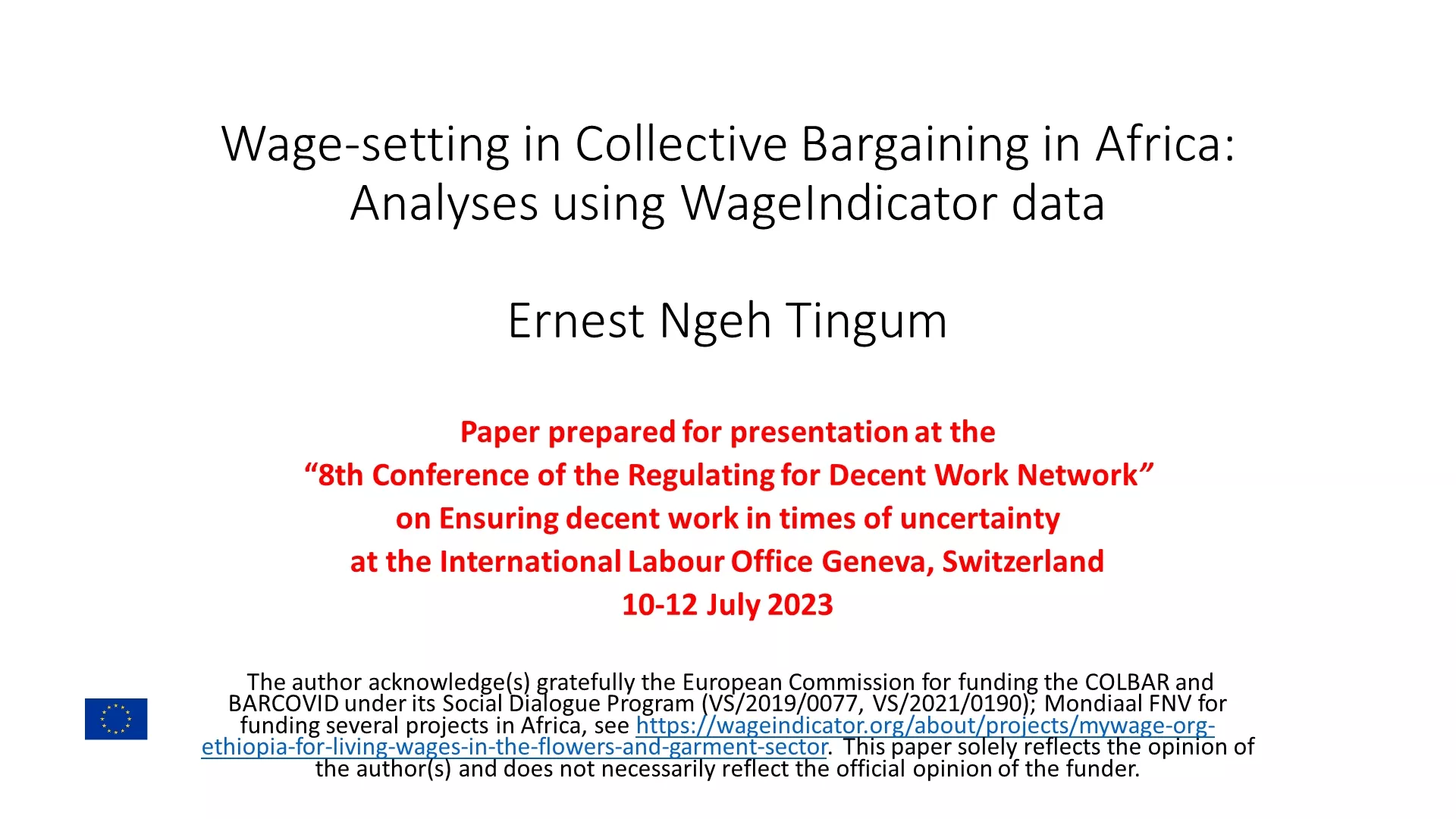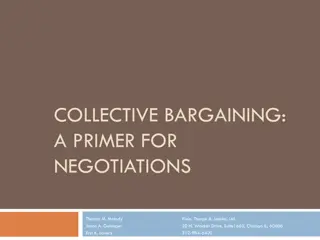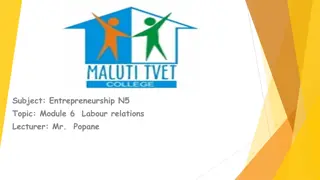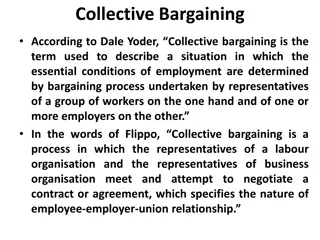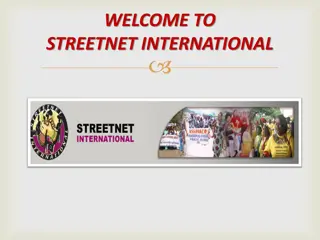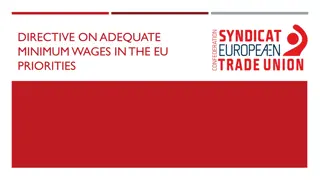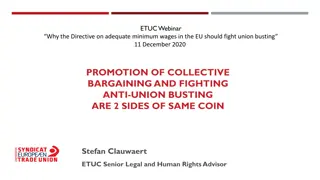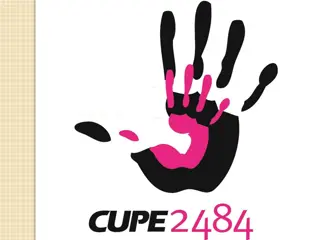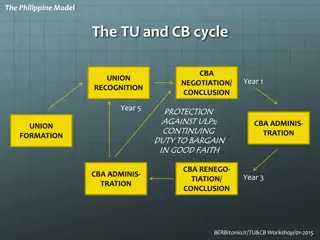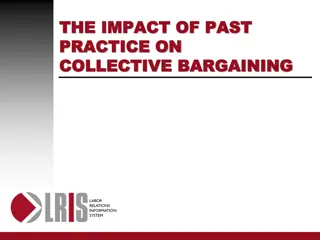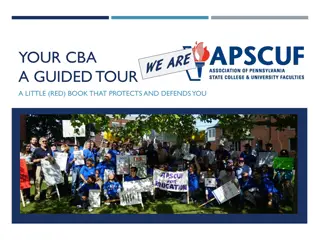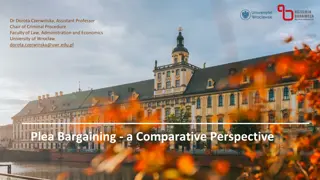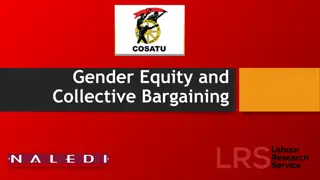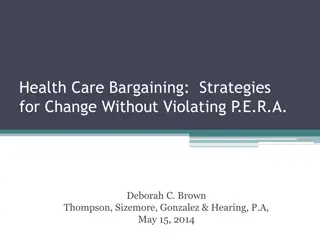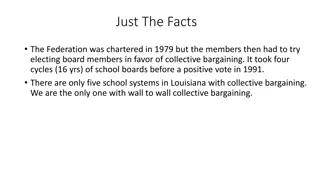Maryland Community College Collective Bargaining: Overview & Implementation
Maryland's Community College Collective Bargaining Law, enacted in 2021, grants employees bargaining rights. The law covers union representation selection, bargaining obligations, unfair labor practice protection, and enforcement by the State Higher Education Labor Relations Board (SHELRB). SHELRB oversees representation elections, adjudicates disputes, and assists in negotiations. The law, effective from September 1, 2022, applies to specified community colleges.
Download Presentation

Please find below an Image/Link to download the presentation.
The content on the website is provided AS IS for your information and personal use only. It may not be sold, licensed, or shared on other websites without obtaining consent from the author.If you encounter any issues during the download, it is possible that the publisher has removed the file from their server.
You are allowed to download the files provided on this website for personal or commercial use, subject to the condition that they are used lawfully. All files are the property of their respective owners.
The content on the website is provided AS IS for your information and personal use only. It may not be sold, licensed, or shared on other websites without obtaining consent from the author.
E N D
Presentation Transcript
Union Representation and Collective Bargaining at Maryland s Community Colleges Presented Presented by by: : STATE HIGHER EDUCATION LABOR RELATIONS BOARD
Community College Collective Bargaining Law Community College Collective Bargaining Law In 2021, the Maryland Legislature enacted a law granting employees of Maryland s Community Colleges collective bargaining rights. The Law Provides: The right of employees to be represented by a labor organization ( Union ) of their choosing in their dealings with their Community College employer Procedures for the selection of a Union as the employees exclusive representative, either by secret ballot election or card check The obligation of Community Colleges to bargain with their employee s selected Union in matters concerning wages, hours and terms and conditions of employment and concluding with a written contract setting forth agreed-upon terms Protection against unfair labor practices and a procedure for the adjudication of such claims
State Higher Education Labor Relations Board State Higher Education Labor Relations Board SHELRB is an independent five-member board that administers and enforces the new Community Colleges collective bargaining law Since July 1, 2001, SHELRB has administered and enforced the collective bargaining law pertaining to Maryland State Colleges and Universities Law requires that four Board members have expertise in higher education of which two also have knowledge of labor issues. Members are appointed by the Governor with advice/consent of the Maryland State Senate Current Board members: Chair Harriet Cooperman, Vice Chair Ben Alston, Members Karl Pence, Milton Lawlor, Erin Roth SHELRB s staff includes: Executive Director Erica Snipes, Assistant Attorney Chris Franzoni, and Special Assistant Denise Galante
State Higher Education Labor Relations Board State Higher Education Labor Relations Board SHELRB: Conducts representation elections Adopts rules and regulations Decides cases concerning representation, elections, unfair labor practice claims, including the collective bargaining relationship between employers and the employees union Assists parties in the event of an impasse in negotiations SHELRB s opinions are posted on its website: https://laborboards.maryland.gov/category/helb-case-log-and-board-opinions/
Staggered Implementation of Law Staggered Implementation of Law Effective September 1, 2022 the Collective Bargaining Law Applies to: Anne Arundel Community College Community College of Baltimore County Frederick Community College Harford Community College Howard Community College Montgomery College Prince George s Community College College of Southern Maryland Effective September 1, 2023 the Collective Bargaining Law Applies to: Allegheny College Carroll Community College Cecil College Chesapeake College Garrett College Hagerstown Community College Wor-Wic Community College Effective October 1, 2024 the Collective Bargaining Law Applies to: Baltimore City Community College
Charges to Colleges Charges to Colleges Colleges are to pay a fee to reimburse SHELRB for its services Colleges will be billed per the number of PIN (non-contractual) employees eligible for collective bargaining Current (FY2023) billing rate is $3 per PIN employee eligible for collective bargaining. Governor's Office of Financial Operations (GOFA) will bill the College Each College is required to provide the number of eligible bargaining unit positions and information for the College s designated fiscal contact, starting with the first 8 Colleges that are now under SHELRB jurisdiction This information shall be due, from each individual college as it comes under the jurisdiction of the SHELRB (see slide 5) The SHELRB will send a notice each individual college to collect this information GOFA will begin billing each college in conjunction with the filing of an election petition
Rights of Employees Rights of Employees The Collective Bargaining Law grants employees the right to: Organize, form, join, or assist any employee organization Bargain collectively through an exclusive representative Engage in other lawful concerted activity for collective bargaining purposes Refrain from engaging in these activities Present a grievance arising under the terms of a collective bargaining agreement Have grievances adjusted with or without the involvement of the exclusive representative (exclusive representative has the right to be present at all grievance meetings)
A College May Not A College May Not Interfere with, restrain, intimidate, or coerce employees in exercise of their statutory rights Encourage or discourage employees in their selection of membership in a Union Discharge or discriminate against an employee for signing or filing affidavit, petition, or complaint, or giving information or testimony on matters covered by law Refuse to participate in good faith bargaining Disclose any personally identifiable information of employees to unauthorized third parties
Rights of Community College Employers Rights of Community College Employers The Law Protects the Community Colleges Right to: Determine how the statutory provisions and goals of the College are to be carried out including College functions/programs, the College s budgets and organizational structure Direct personnel
A Union May Not A Union May Not Interfere with, intimidate, restrain, coerce, or discriminate against an employee because the employee exercises these statutory rights
STRIKES STRIKES Community College employees may not engage in a strike A Court can enjoin a strike by Community College employees at the request of the College If a Union that has been certified as the exclusive representative of employees engages in a strike, SHERLB shall revoke the Union s certification as the exclusive representative The Union shall be ineligible to be certified as an exclusive representative for a period of 1 year from the end of the strike
Which Employees Are Covered By The Law? Which Employees Are Covered By The Law? Full Time Faculty Includes employees whose assignment includes academic responsibilities, including teachers and Department Heads Part Time Faculty Includes employees whose assignment includes academic responsibilities, including teachers, counselors and Department Heads designated as part time faculty status Eligible Nonexempt employees as defined in FLSA Excludes supervisory, professional, and administrative employees who exercise independent discretion over matters of significance
Which Employees Are Which Employees Are Not NotCovered By The Law? Covered By The Law? Officers President , Vice President, Dean, or any other similar official of Community College appointed by the Board of Community College Trustees Supervisors Full-time and exclusive authority to act on behalf of College to hire, transfer, suspend, lay off, recall, promote, discharge, assign, reward, or discipline other employees, or adjust employee grievances Confidential Employees Unrestricted access to personnel, budgetary, or fiscal data which may be used by Community College in collective bargaining, or whose continuing working relationship with those responsible for negotiating on behalf of College would make employee s membership in Union represented bargaining unit incompatible with employee s duties Student Assistants
Determining Employee Eligibility Determining Employee Eligibility An employee s actual job functions, duties and responsibilities, not their title or job classification, are the key factors SHELRB considers in determining whether the employee is an eligible employee under the law For example, an employee who has a title of manager but does not supervise any employees and does not possess authority to hire, fire, discipline, promote, transfer, or make employment decisions affecting other employees, may be an eligible employee and included in a bargaining unit with other employees who share a community of interest
Bargaining Units Bargaining Units A Bargaining Unit includes employees in specific job classifications that share a community of interest with one another The Community College Collective Bargaining Law creates 4 bargaining units: Full Time Faculty Unit Part Time Faculty Unit Nonexempt Employees 2 Units
What is An Exclusive Representative? What is An Exclusive Representative ? A labor organization selected by a majority of employees in the designated bargaining unit through an election or SHELRB confirmation of >50% showing of interest and certified by SHELRB is the exclusive representative of all of the employees in the bargaining unit Union membership/dues is not required for representation The College must recognize the Union as the employees representative and bargain with the union over terms and conditions of employees employment and engage with the Union in the settlement of grievances The College cannot recognize or bargain with any other Union regarding these employees, or with any individual employee or group of employees Exclusive representative shall represent all unit employees fairly with no discrimination
How Does a Union Become How Does a Union Become the Employees Exclusive Representative? the Employees Exclusive Representative? Showing of Interest Form Written statement signed by bargaining unit employee stating employee desires Union to be employee s collective bargaining representative Must be signed within 18 months preceding election petition Union must have showing of interest from at least 30% of employees in the bargaining unit to petition SHELRB for an election Colleges required to: Provide Unions access to grounds, rooms, bulletin boards, campus mail, and other common areas and forums in effort to obtain signed authorization cards from employees Allow all lawful labor-related expressive activities under principles of fair and neutral access Provide same privileges to all Union candidates in election
How Does a Union Become How Does a Union Become the Employees Exclusive Representative? the Employees Exclusive Representative? Colleges may not: Alter or revise existing speech access rules or practices for the campus community or general public in order to unfairly limit or prevent employees or election candidates in organizing for collective bargaining Spend public money or resources or provide assistance to individuals or groups for a negative campaign against an employee organization
How Does a Union Become How Does a Union Become the Employees Exclusive Representative? the Employees Exclusive Representative? 1. Once Union has obtained showing of interest from at least 30% of employees in the bargaining unit, Union may petition SHELRB for an election SHELRB Executive Director notifies the College of the filing of Petition Within 2 days of notice, College must provide SHELRB: Alphabetical list of employees in petitioned bargaining unit, including each employee s: Name Position classification Home and work address where employee receives interoffice or U.S. mail Home and worksite telephone numbers Personal cellphone number Work email address Identification of each employee who should be excluded from unit and statement of reason for exclusion. Challenge is invalid if no reason given SHERLB shall determine the appropriateness of bargaining unit and eligibility of employees SHELRB may conduct a hearing to determine whether: (a) challenged employees should be excluded from the bargaining unit; and (b) College s challenge to appropriateness of unit Union seeks to represent. 2. 3. 4. 5.
How Does a Union Become How Does a Union Become the Employees Exclusive Representative? the Employees Exclusive Representative? 4. SHELRB Executive Director determines adequacy of showing of interest by comparing forms to College s list of employees and notifies Union of determination 5. If showing of interest is inadequate, Union shall have 30 days to supplement showing of interest or additional time upon a showing of good cause 6. Any other Union may then intervene in the election if it has showing of interest from at least 10% of bargaining unit employees 7. Within 2 days of notification of SHELRB s direction of election, College shall make notice of each election publicly available to all eligible employees 8. Within 7 days of SHELRB directing election, College shall: provide an updated employee list with same information as required in initial filing provide Unions access to College property and facilities to conduct election campaign activities But campaign activities shall not interfere with College s operations 9. Employees may contact SHELRB s Executive Director with any questions regarding the election process
How Does a Union Become How Does a Union Become the Employees Exclusive Representative? the Employees Exclusive Representative? Representation Election Conducted by SHELRB Election Ballot must include as choices: Petitioning Union Any Intervening Union No exclusive representation Election conducted by Secret Ballot Voting may be electronic, mail, or in person. Parties may express preference; SHELRB makes final determination if parties disagree SHELRB designates time period for voting after discussion with union(s) and college representatives, but will be no less than 10 days Union receiving a majority of votes casts will be certified as exclusive representative If no choices receive a majority of votes, runoff election will be held between 2 choices receiving highest number of votes
How Does a Union Become How Does a Union Become the Employees Exclusive Representative? the Employees Exclusive Representative? Election may not be conducted in any bargaining unit in which: An exclusive representative has been certified within the immediately preceding 24 months A valid election has been held within the immediately preceding 12 months in which an exclusive representative was certified Contract Bar Rule If a collective bargaining agreement is in effect, a valid petition for an election must be submitted at least 90 days but no more than 120 days prior to the expiration of the agreement
How Does a Union Become How Does a Union Become the Employees Exclusive Representative? the Employees Exclusive Representative? Union/Exclusive Representative Recognition without an Election Collective bargaining representation/contracts in effect before September 1, 2022 are recognized and remain effective until they expire. Thereafter, current law applies, and recognition as exclusive representative must be sought via election or the method noted below. A Union may be certified as the exclusive representative without an election if: Only ONE union seeks to be the exclusive representative (no intervenors), and There is no existing exclusive representative, and Union providing the showing of interest has not requested an election, and SHELRB determines that the showing of interest establishes that more than 50% of the bargaining unit employees desire the Union to be their exclusive representative
WHAT Does Collective Bargaining Include? WHAT Does Collective Bargaining Include? Collective bargaining covers matters relating to: Wages, hours, and other terms & conditions of employment Procedures for the employee organization (union) to receive membership dues through payroll deduction Parties are required to: Meet at reasonable times Make every reasonable effort to conclude negotiations with a final written agreement in a timely manner before the College budget submission date Agreements may: Include a section about the arbitration of grievances arising under the agreement Agreements may NOT: Include information relating to the employers /teachers retirement or pension systems otherwise covered by another area of the Maryland Code but parties may discuss such matters Agreement terms supersede any conflicting regulations or administrative policies of College
WHAT Does Collective Bargaining Include? WHAT Does Collective Bargaining Include? College shall timely submit request for funds necessary to implement Agreement s terms for consideration in County budget process (separate process for Baltimore City Community College) If County governing body reduces, modifies, or rejects request for funds to implement Agreement, either party may reopen agreement no later than 20 days after final budget action
Collective Bargaining IMPASSE Procedures Collective Bargaining IMPASSE Procedures 1. If a party determines that an impasse in negotiations exists, the parties may mutually request the SHERLB s services in mediation or engage another mutually agreeable mediator 2. If parties do not agree to mediate or if mediation is unsuccessful, either party may petition SHELRB to initiate Fact-Finding or SHELRB may initiate on its own, including the appointment of a neutral fact-finder who shall issue a report with findings of fact and recommendations Cost of Fact-Finding shared equally by parties 3. If Fact-Finding does not resolve the impasse, the Board shall issue a decision determining the unresolved non-economic issues by adopting the College s or Union s final proposal or the Fact-Finder s proposed resolution
Required Production of Employee Information Required Production of Employee Information Within 10 days after new employee s hire date, College must provide bargaining unit s exclusive Union representative information pertaining to new employee in electronic and searchable format (same employee information as required during election petition process) Union to keep information confidential Union may use information to solicit membership in Union Employees may request in writing that College instruct Union not to communicate further with employee unless required by law or employee subsequently revokes request College must provide Union with information on all bargaining unit employees every 90 days Union and College may negotiate a shorter period for College to produce employee information
New Employee Processing New Employee Processing New Employee Processing includes in-person, online or other means by which College informs new employees about their employment status, rights, benefits, duties, responsibilities, and other employment-related matters College must provide exclusive Union representative access to new employee processing and at least 10 days advance notice of processing. Shorter notice permitted if urgent need for new employee processing that was unforeseeable. College and Union are to negotiate structure, time and manner of Union s access Either party may request SHELRB to declare an impasse if there is an unresolved dispute in new employee processing negotiations SHELRB or Mediator to resolve new employee processing dispute, by considering such factors as: Union s ability to communicate with employees, legal obligations of Union to employees, interest and welfare of employees and financial condition of College, structure, time and access of exclusive representatives at comparable public employers, any other relevant factors
What If There Is A Problem? What If There Is A Problem? Cases/Claims/Complaints that may be filed before SHELRB Unit Clarification Appropriate Bargaining Unit Exclusion of employee from bargaining unit Impasse in collective bargaining negotiations and new employee processing Unfair Labor Practice Decertification Petition Decertification/Certification Petition
Unfair Labor Practice (ULP) Unfair Labor Practice ( ULP ) ULP charges for violation of statutory rights and obligations may be filed: Against the College by Union or by employees Against a Union by employees or the College ULP Process: 1. The ULP must be filed with SHELRB and served on opposing party within 90 days from when a reasonable person knew or should have known about the underlying circumstances giving rise to the ULP 2. Executive Director notifies parties of deadlines for response and potential motions/responses due dates. Responses are due twenty (20) days after the ULP was filed/served, motions have a seven (7) day response window.
Unfair Labor Practice (ULP) Unfair Labor Practice ( ULP ) 4. Executive Director investigates matter and makes recommendations to the Board on whether there is sufficient probable cause to move forward for Board review. This means: Is the ULP timely filed, does the SHELRB have jurisdiction over the employee/employer/union, has the filing party alleged a proper claim that that the SHELRB can review? The defenses to the underlying facts of the ULP are for the SHELRB to review, if the probable cause threshold has been met. 5. Executive Director will issue a written recommendation to the Board 6. Party dissatisfied with Executive Director s recommendation may request reconsideration from the Board within 15 days of issuance of the Executive Director s recommendation. 7. SHELRB may conduct a public hearing, including witness testimony, documentary evidence and oral argument. SHERLB may permit pre-hearing discovery and require additional legal briefing. 8. SHERLB will issue a final opinion on the ULP complaint. 9. SHERLB s final opinion is appealable to the Circuit Court in the jurisdiction where the ULP was first filed.
Decertification and Decertification/Certification Decertification and Decertification/Certification Decertification: If bargaining unit employees no longer desire to be represented by a certified Union, they may petition SHELRB to conduct a Decertification election Decertification/Certification: If another Union asserts that the certified exclusive representative no longer represents a majority of employees and, rather, it represents a majority of employees, the Union may petition SHERLB for a decertification/certification election Requires at least 30% showing of interest that the existing designated certified exclusive representative is no longer the representative of a majority of bargaining unit employees Petitioning Union seeking decertification/certification: 30% showing of interest must also assert that a majority of bargaining unit employees are represented by petitioner Showing of interest is valid if it is no older than 90 days prior to the filing of petition Decertification Elections and Decertification/Certification Elections are run in the same manner as regular elections A Decertification or Decertification/Certification Petition may only be filed between 120 and 90 days before the expiration of a current collective bargaining agreement or after the expiration of the CBA that has not been replaced by a new CBA
Question & Answer Session Question & Answer Session Do attendees have any questions for the SHELRB Board members or staff?
